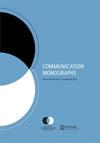How moral adaptability relates to communication and friendship with morally dissimilar others
IF 3.1
2区 文学
Q1 COMMUNICATION
引用次数: 0
Abstract
ABSTRACT Moral differences hinder communication and relationship formation. However, perceptions and reactions to moral dissimilarity varies. Accordingly, we explored how moral adaptiveness (a flexible application of morality) relates to the intent to communicate with and befriend morally dissimilar others by focusing on moral relativism (believing that morals are subjective) and moral tolerance (believing that one should not condemn/change dissimilar others). We observed adaptiveness’ relationships with the willingness to communicate (WTC) with morally dissimilar others and greater moral diversity in close friendship networks. Surveys of convenience samples of adults recruited through MTurk (Nstudy1 = 325; Nstudy2 = 1219) demonstrated partial evidence of a positive link between moral adaptiveness and WTC. By comparison, a consistent relationship between adaptiveness and the moral diversity of friendship networks did not emerge.道德适应性是如何与道德不同的人进行交流和友谊的
本文章由计算机程序翻译,如有差异,请以英文原文为准。
求助全文
约1分钟内获得全文
求助全文
来源期刊

Communication Monographs
COMMUNICATION-
CiteScore
5.40
自引率
0.00%
发文量
12
期刊介绍:
Communication Monographs, published in March, June, September & December, reports original, theoretically grounded research dealing with human symbolic exchange across the broad spectrum of interpersonal, group, organizational, cultural and mediated contexts in which such activities occur. The scholarship reflects diverse modes of inquiry and methodologies that bear on the ways in which communication is shaped and functions in human interaction. The journal endeavours to publish the highest quality communication social science manuscripts that are grounded theoretically. The manuscripts aim to expand, qualify or integrate existing theory or additionally advance new theory. The journal is not restricted to particular theoretical or methodological perspectives.
 求助内容:
求助内容: 应助结果提醒方式:
应助结果提醒方式:


